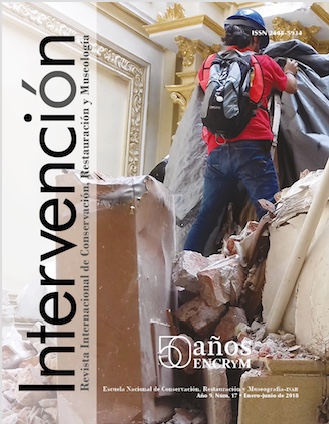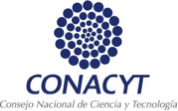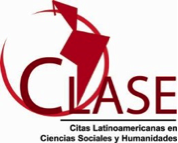Revisiting to Understand: An Evaluation of the Influence of Conservation on the Display Representation of Hernan Cortes’ Funerary Cloth, Mexico
DOI:
https://doi.org/10.30763/Intervencion.2018.17.189Keywords:
representation, object biography, museum display, funerary cloth, Museo Nacional de Historia, Hernan Cortes, MexicoAbstract
This ESSAY draws upon Igor Kopytoff’s article “The Cultural Biography of Things: Commoditization as Process” (1986) to analyse the cultural biography of Hernan Cortes’ funerary cloth, a remarkable item that is part of the collection of the Museo Nacional de Historia, Instituto Nacional de Antropología e Historia (MNH, National Museum of History, National Institute of Anthropology and History), Mexico. By examining the way certain practices (i.e. documentation, conservation treatment and display) recently influenced this artefact’s representation, it offers a critical perspective by integrating the object’s biography. Thus, this ESSAY adds to recent debates regarding the impact of conservation on museum interpretation.
----------------------------------------------------------------
El presente ENSAYO retoma el artículo “The Cultural Biography of Things: Commoditization as Process” de Igor Kopytoff (1986) para plantear una biografía cultural del Pañuelo Funerario de Hernán Cortés, un artefacto de gran importancia que es parte de la colección del Museo Nacional de Historia, Instituto Nacional de Antropología e Historia (MNH-inah), México. Al explorar la manera en la que ciertas prácticas (tales como la documentación, los tratamientos de conservación-restauración y el montaje expositivo) influenciaron la reciente representación de este artefacto, se propone una perspectiva crítica que integra su biografía cultural. Por lo tanto, este ENSAYO busca contribuir a los debates actuales sobre el impacto de la conservación-restauración en la interpretación museográfica.
Downloads
References
Almarza, N. (1946) Hospital de Jesús (Antiguo hospital de la Concepción), Mexico City, Multa Paucis Médica, AHINAH, ASZ, Serie INAH, caja 3, exp. 112.
Borghese, Barbara (2014) “Cortez funerary linen conserved at INAH”, News in Conservation, 45, retrieved from [https://www.iiconservation.org/node/5417], accessed February 7, 2017.
Brooks, Mary & Dinah Eastop (2016). “Introduction: Interactions of Meaning and Matter”, in Mary Brooks and Dinah Eastop (eds.), Refashioning and Redress: Conserving and displaying dress, 1-18, Los Angeles, Getty Conservation Institute.
______ (2006). “Matter out of Place: Paradigms for Analysing Textile Cleaning”, JAIC. Journal of the American Institute for Conservation, 45 (3):171-81, retrieved from [http://dx.doi.org/10.1179/019713606806112478], accessed March 2017.
______ (2015). “Worn Dress: Display as Meaning-Making”, in Proceedings of the ICOM Costume Committee Annual Meeting, Toronto, International Council of Museums.
Brooks, Mary, Alison Lister, Dinah Eastop & Tarja Bennett (1996). “Artifact or information? Articulating the Conflicts of Conserving Archaeological Textiles” in Ashok Roy and Perry Smith (eds.), Archaeological Conservation and its Consequences. Preprints of the Contributions to the Copenhagen Congress, 26-30 August 1996, IIC, London, International Institute for Conservation, 16-21.
De la Torre Villar, Ernesto (1998). Lecturas históricas mexicanas, 2ª edición. México, Universidad Nacional Autónoma de México, Instituto de Investigaciones Históricas, retrieved from [http://www.historicas.unam.mx/publicaciones/publicadigital/libros/lecturas/histmex01.html], accessed December 2017.
Eastop, Dinah & Charlotte Dew (2006). “Context and Meaning Generation: The Conservation of Garments Deliberately Concealed Within Buildings”, in David Saunders, David Joyce Townsend, Sally Woodcock (eds.), The Object in Context: Crossing Conservation Boundaries. Contributions to the Munich Congress, 28 August-1 September 2006, London, International Institute for Conservation of Historic and Artistic Works, 17-22.
Eastop, Dinah (2006). “Conservation as Material Culture”, in Chris Tilley, Webb Keane, Susanne Küchler, Mike Rowlands and Patricia Spyer, Handbook of Material Culture, London, Sage Publications, 516-533.
Flavin, Susan (2014). Consumption and Culture in Sixteenth-Century Ireland: Saffron, Stockings and Silk. Woodbrige, The Boydell Press.
Flury-Lemberg, Mechtild (1988). Textile conservation and research: a documentation of the Textile Department on the occasion of the twentieth anniversary of the Abegg Foundation, trans. Pamela Leibundgut, Bern, Die Stiftung.
García-Vedrenne, Laura Gisela & Eva Mariana Olguín Hernández (2014). Informe sobre la intervención de dos textiles del acervo del Museo Nacional de Historia, Castillo de Chapultepec: Bandera del 12°. Batallón de Línea/Pañuelo funerario que cubrió los restos de Hernán Cortés, MNH/ECRO, Coordinated by Verónica Liliana Kuhliger Martínez, Archivo Técnico del Taller de Restauración del MNH, Mexico City, unpublished manuscript.
García-Vedrenne, Laura Gisela & Verónica Liliana Kuhliger Martínez (2015). “Un legado de Hernán Cortés en el Museo Nacional de Historia (MNH-INAH), México. Diagnóstico, investigación histórica, análisis material y restauración de un pañuelo funerario de los siglos XVIII-XIX”, Intervención, Revista Internacional de Conservación, Restauración y Museología, 12:53-66.
García-Vedrenne, Laura Gisela (In press). “Un pañuelo con memoria histórica y material: recientes hallazgos”, in Verónica Kuhliger (ed.), Memorias de las Charlas en torno a la exposición Hilos de Historia, Mexico, Museo Nacional de Historia/Instituto Nacional de Antropología e Historia.
INAH (2015a). “Cedulario”, Hilos de Historia, Colección de Indumentaria del Museo Nacional de Historia, Mexico, Instituto Nacional de Antropología e Historia (INAH), retrieved from [http://mediateca.inah.gob.mx/islandora_74/islandora/object/exposicion:719/datastream/CEDULARIO/view], accessed February 2018.
______ (2015b). “El pañuelo funerario de Hernán Cortés”, Hilos de Historia, Colección de Indumentaria del Museo Nacional de Historia, México, Instituto Nacional de Antropología e Historia (INAH), retrieved from [http://www.inah.gob.mx/multimedia/hilos_mnh/panuelo/panuelo.html], accessed February 2018.
______ (2016). “Estudio de público, exposición Hilos de Historia” INAH TV, México, Instituto Nacional de Antropología e Historia (INAH). Video retrieved from [https://www.youtube.com/watch?v=N8MTINFIayI], accessed February 2018.
Keyserlingk, Michaela (1998). “Moral dilemma in textile conservation”, in Ágnes Timár-Balázsy and Dinah Eastop (eds.), International Perspectives on Textile Conservation. Papers from the ICOM-CC Textiles Working Group Meetings, Amsterdam, 13-14 October 1994 and Budapest, 11-15 September 1995, London, Archetype Publications, 47-49.
Klinger, Jane E. (2013). “Objects of Trauma, Finding the Balance”, in Pamela Hatchfield (ed.), Ethics & Critical Thinking in Conservation, Washington D.C., American Institute for Conservation of Historic and Artistic Works, 79-90.
Kopytoff, Igor (1986). “The Cultural Biography of Things: Commoditization as Process”, in Arjun Appadurai (ed.), The Social Life of Things. Commodities in Cultural Perspective, Cambridge, Cambridge University Press, 64-91.
Life Magazine (1946). “Mexicans find the lost bones of Cortes”, Original Life Magazine, December 16:43-46, retrieved from [https://books.google.com.mx/books?id=oE0EAAAAMBAJ&pg=PA43&source=gbs_toc_r&redir_esc=y#v=onepage&q&f=false], accessed July 2014.
Lubar, Steven (2007). “Exhibiting memories”, in S. Watson (ed.), Museums and Their Communities, London, Routledge, 397-405.
Muñoz Viñas, Salvador (2005). Contemporary theory of conservation, London, Elsevier Butterworth-Heinemann.
NOTIMEX (2014). “INAH restaura pañuelo funerario de Hernán Cortés”, Excelsior, Mexico, November 25, retrieved from [http://www.excelsior.com.mx/expresiones/2014/11/25/994256#imagen-2], accessed March 2017.
Phillips, Kristin (2016). “Conserving Damage: Clothing Worn by Indira Gandhi and Rajiv Gandhi at the Time of their Assassinations”, in Mary Brooks and Dinah Eastop (eds.), Refashioning and Redress: Conserving and displaying dress, Los Angeles, Getty Conservation Institute, 225-236.
Rangel, Saraí J. (2016). “Tras los restos de Hernán Cortés. Reliquia del conquistador”, Muy Interesante, 9:62-66.
Rueda Smithers, Salvador (2010). “La invención del pasado, los héroes y la polémica por la historia”, in México, 200 años: la patria en construcción, México, Presidencia de la República, 409-451.
______ (2014). Personal communication, July 7.
Yamamoto, Yoko Sugiura, César Villalobos Acosta, and Elizabeth Zepeda Valverde (2013) “Biografía cultural de la cerámica arqueológica desde la perspectiva de la materialidad: El caso del Valle de Toluca”, Anales de Antropología, 47:63-90, retrieved from [https://www.sciencedirect.com/science/article/pii/S0185122513710191], accessed February 2018.
Additional Files
Published
How to Cite
Issue
Section
License
Copyright (c) 2018 Instituto Nacional de Antropología e Historia (INAH)

This work is licensed under a Creative Commons Attribution-NonCommercial 4.0 International License.

Atribución-NoComercial 4.0 Internacional
https://creativecommons.org/licenses/by-nc/4.0/deed.es
Usted es libre de:
- Compartir — copiar y redistribuir el material en cualquier medio o formato
- Adaptar — remezclar, transformar y construir a partir del material
Bajo los siguientes términos:
-
Atribución — Usted debe dar crédito de manera adecuada, brindar un enlace a la licencia, e indicar si se han realizado cambios. Puede hacerlo en cualquier forma razonable, pero no de forma tal que sugiera que usted o su uso tienen el apoyo de la licenciante.
-
No Comercial — Usted no puede hacer uso del material con propósitos comerciales.




















